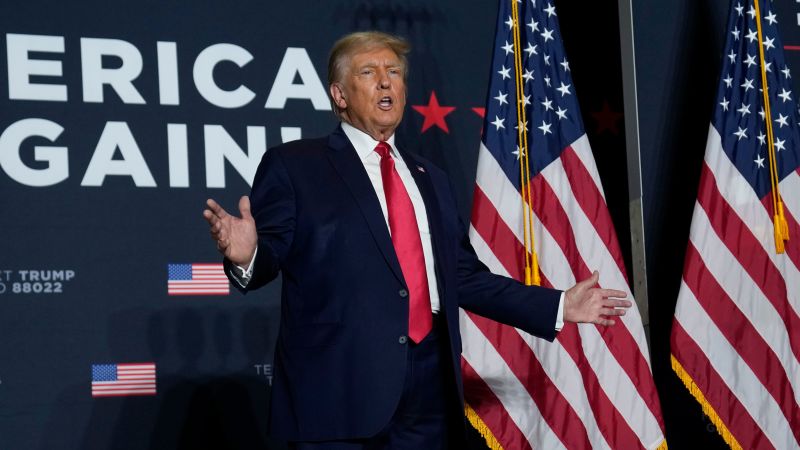
CNN
—
Former President Donald Trump is scheduled to have his busiest stretch of campaigning this week since launching his bid for a second White House term last fall. But one stop will be notably absent from the GOP front-runner’s schedule: the second Republican primary debate.
While his GOP rivals begin the week preparing for Wednesday’s debate at the Ronald Reagan Presidential Library in Simi Valley, California, Trump is taking a dual approach of shoring up support in early-nominating states and wooing swing-state voters who will be vital to his general election prospects if he wins the GOP nod.
The former president kicked off the week Monday afternoon with a rally in the early-voting state of South Carolina. He plans to follow that with a visit to Michigan on Wednesday to give a speech before union workers. He is scheduled to be in California on Friday – two days after the debate – to speak at the state GOP’s fall convention in Anaheim. And on Sunday, Trump will travel to Ottumwa, Iowa, to hold a commit-to-caucus event and deliver policy remarks largely focused on agriculture, according to a source familiar with his plans.
Trump’s rally Monday took place at Sportsman Boats in Summerville in the greater Charleston area.
The former president used ominous rhetoric in his speech, describing the 2024 campaign as the “final battle.”
“With you at my side, we will demolish the deep state, and we will expel the warmongers,” he said.
Trump enjoys wide leads in the GOP primary polls both nationally and in South Carolina, which is home to two of his primary opponents – former Gov. Nikki Haley and US Sen. Tim Scott. Haley and Scott are among several candidates currently vying for second place in GOP polling and a chance to emerge as the main Trump alternative for primary voters.
Ahead of the rally, Trump announced a series of endorsements from state Republican officials, including Attorney General Alan Wilson and Secretary of State Mark Hammond. Trump already had the backing of South Carolina Gov. Henry McMaster and Lt. Gov. Pamela Evette, as well as the state’s senior US senator, Lindsey Graham.
On Wednesday, the former president travels to Detroit to give a prime-time speech, which will serve as counterprogramming to the second GOP presidential debate. He’s slated to speak to an audience that will include current and former union members amid the ongoing United Auto Workers strike, which began after the union and the nation’s three largest automakers failed to reach a deal to avert it.
Trump has publicly questioned the point of participating in primary debates when he holds a commanding lead over the rest of the GOP field in national polls. He skipped the first debate in August and instead sat for a pre-taped interview with former Fox News host Tucker Carlson that was streamed on social media during the debate.
His trip to Michigan also signals the former president has an eye on the general election and a potential rematch with President Joe Biden – who on Tuesday is making his own trip to Michigan, where he will walk the picket line with UAW workers. Trump has lambasted Biden’s trip, asserting that the president is only going because Trump had announced his own visit. Trump narrowly won Michigan in 2016 but then lost the battleground state in 2020 to Biden. Ahead of his trip, Trump’s campaign released a radio ad in Detroit and Toledo, Ohio, bashing Biden over his support for transitioning the auto industry to electric vehicles and casting Trump as supportive of autoworkers.
Trump then travels to the West Coast on Friday to join several other 2024 rivals in speaking at a convention hosted by the California Republican Party in Anaheim. Scott and Florida Gov. Ron DeSantis are scheduled to take the stage the same day as Trump, and entrepreneur Vivek Ramaswamy has a speaking slot the following day.
After being indicted four times, Trump is now attempting to navigate a presidential campaign while he is a defendant in multiple criminal trials. The former president faces a sweeping Georgia indictment that accuses him of being the head of a “criminal enterprise” to overturn the 2020 election in that state; a New York indictment over allegations that he falsified business records to disguise hush money payments related to the 2016 campaign; a federal indictment related to his alleged mishandling of classified documents after he left office; and a separate federal indictment over his efforts to try to overturn the 2020 election results. He has pleaded not guilty to all 91 charges and has denied any wrongdoing.
This story has been updated with additional information.
